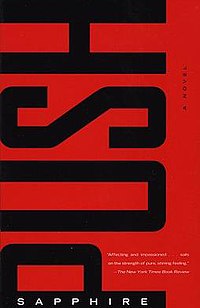
If I said, "Have you read the recent Sapphire book?" or "Did you read Push when it came out in 1996?" - how many people would know what I was referring to? How about if I asked, "Did you see the movie Precious?" Sapphire, a New York performance poet and fiction author, wrote Push about one of her students. It took thirteen years for the script to make it into film, when Push was submitted as a piece for the Sundance Film Festival in January 2009. Because another entry that year was also called Push, the name of the Sapphire-inspired script was changed to Precious. After dominating at the Festival, Precious went mainstream and exploded, winning multiple Academy Awards. Names like Mo'Nique (Best Supporting Actress as Precious' mother), Oprah Winfrey (marketing), and Lee Daniels (director) often get attached to the story. Sapphire's often does not.
The author's sequel to Push, called The Kid, was published in July 2011. I read a great review on Lamdba Literary by Julie Enszer, who deeply analyzes the novel's powerful themes like sexuality, harsh poverty, and racism in a firm and authentic way. For the characters of both Push and The Kid, life is more difficult than many readers can imagine. Enszer highlights the ways in which Sapphire has translated this cruel world realistically onto the pages of the book. With much grace, Sapphire offers the reader in-your-face drama of the truest caliber, but neither fluffs the good moments for the protagonist, Abdul, nor draws out the horror. "In some of the most brutal moments of the story," Enszer writes. "[the author] delivers extraordinary humanity while still acknowledging its limits."
Abdul, who is Precious' second son, faces a world of hatred, violence, and detestation. He is beaten, abused, raped, violated, cursed and, amidst it all, tries to explore the question, "Who am I?" To answer, he must find responses to other questions like, "Am I gay?" and "Why is this my life?" and "What do I want?"
Without sugarcoating a damn thing, Sapphire starkly points out that most of those questions cannot be answered. Not by adolescents, not by adults, not by most readers. Because direct questions about overarching life themes do not have direct answers - many novels and films lead us to believe the opposite. As Enszer says, "We live in a world that programs us to desire simple truths but delivers us complexity. We want vibrant, organized rainbows or at least the clarity of black and white; we get gray. Sapphire renders the gray palette not as a spectacle but as a rich, multi-layered monochromatic rainbow."
All of this - the author offers all of this - and so few people know her name.
People know J.K. Rowling's name, people know Stephenie Meyer's name. It's no secret that Chuck Palahniuk wrote Fight Club, even though his name is nowhere on the 1996 film poster. Those authors are lucky.
Not many people know the name "Sapphire;" few haven't heard the name "Precious." In fact, the full name of the 2009 film is Precious: Based on the Novel Push by Sapphire, but the title gets lost in articles, reviews, and conversation. It happens all the time when novels turn into movies and many people opt out of the book and head straight for the theater, just to hear the story. But I noticed that even critics left Push by the wayside.
I got online to find a book review of Sapphire's first novel and really had to dig. I found a lukewarm, badly written piece where the writer summarizes the plot and has a strange "Observation" section, where she babbles about the number of times Push never made it into her cart at bookstores because "of sheer disgust at the opening lines as well as the language." I found another curt review of the book on Amazon. That was about it. When I googled "book review Push Sapphire," almost every result was for "movie review Precious: Based on the Novel by Sapphire." The NY Times. TIME Magazine. NPR. All great film reviews - but what about the book?
Precious' story is being told, but it isn't Sapphire's version. Granted, the novel broke crazy records in book sales, but what about since then? Why isn't Sapphire's name - her strong, poetic prose, her disturbingly realistic character voices - why aren't those prominent in the media? The Kid has been better. With all the coverage from the film, Sapphire's sequel splashed through media outlets. Google The Kid and you'll find more than enough results.
Powerful stories need to be told. Precious' story needed to be heard. It blasted through the book's written pages for a smaller audience, and radiated on the big screen for a much larger audience, causing all involved to think. To look deeper. Precious' story was, in fact, told. My hope is that authors like Sapphire start to get more credit for the words that transform audiences. Appreciate the story. But, more than that, appreciate the artist.
No comments:
Post a Comment